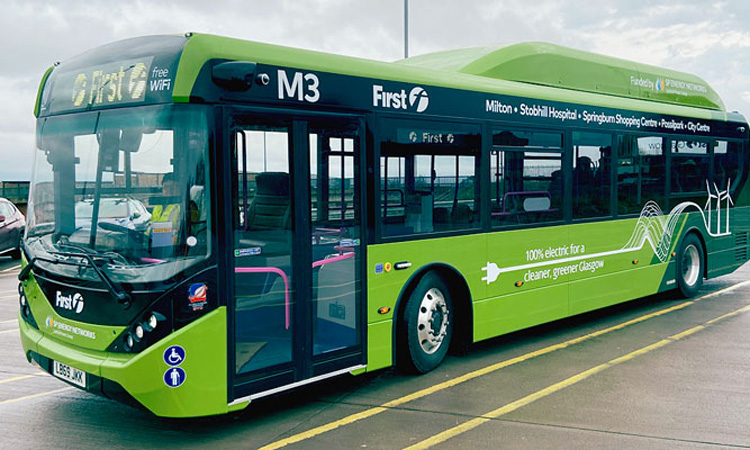Powersystems are actively powering the transition to a carbon free future in the UK bus transport sector. The high voltage specialist electrical engineering team are in the process of delivering electric EV Infrastructure works at the Caledonia depot which is to become the UK First Bus Glasgow’s largest Electric Vehicle (EV) charging hub, marking a significant step towards the bus operator’s net zero targets, as well as the UK’s wider ambitions.
Powersystems, Site Supervisor, Will Tanner updates, ‘At the moment we have completed the LV cabling between the customer HV /LV substation and each charger power supply unit where the AC/DC inverters are held ready for the DC charge posts and power supply units to be delivered and installed in a couple of weeks. Our commissioning team are currently cold commissioning the high voltage switch gear and transformer substation in readiness for final connection to Scottish Powers sub-station.
Scotland is leading the world on climate action, with an ambitious target to reduce greenhouse gas emissions 75 percent by 2030. At First Glasgow, they are passionate about the role they must play in making this happen, and they believe that the work we are doing in Glasgow will serve as a green transport model to other cities.
The Caledonia depot in Glasgow is the UK’s largest, making its electrical transformation an ambitious project. In March 2023, once the project is complete, the depot will have space to charge up to 300 EV buses on site. The project has a phased completion schedule, with phase one expected to be complete by September this year, allowing for the introduction of an additional 22 electric buses to Glasgow’s streets. A further 126 EV buses will be delivered and in service over 2021 and 2022, taking the total electric fleet in the city to 150 (including two EVs already in service).
This transformation is in part supported by £28.2m in funding from the Scottish Government’s Scottish Ultra Low Emission Bus Scheme (SULEB). Since the introduction of the first two electric buses by First Glasgow in 2019, the Scottish Government and Scottish operators have been keen to continue making progress towards net zero targets.
SULEB funding, which provides up to 75 percent of the gap funding between diesel and alternative fuelled buses, along with 75 percent towards the cost of infrastructure changes, has been instrumental in allowing large scale changes such as this project to take place. It’s a wonderful example of what can happen when governments, local authorities and private companies share a vision and collaborate effectively – with the right resources and the right people real progress can be made.
The Caledonia depot transformation is also a fantastic example of work being done now to benefit everyone in the future. Not only will it enable us to power more electric vehicles in the immediate future, it gives us the capacity for us to expand. As it stands, we have funding for 150 vehicles, but our plans mean that we will have space for an additional 150 on top of that, leaving Glasgow well set up for more electric vehicles. This forward-thinking mindset is critical for us to meet our ambition of running a zero-emissions fleet.
Transport is the largest contributor to UK domestic greenhouse gas emissions, responsible for 24% of domestic emissions in 2019. Reducing transport emissions is a crucial part of tackling climate change, meeting the UK’s net zero target and embracing the 2030 internal combustion engine (ICE) phase out, with the additional benefits of reducing air and noise pollution and creating skilled jobs across the supply chain.
Notes to Editors:
Contact Information:
- This article is written by Jules Daly, Marketing and Communications Manager at Powersystems UK.
- Email jules.daly@powersystemsuk.com Telephone 01454 318000
- Photography Copyright please credit all images used to powersystemsuk.co.uk
Powersystems are powering the transition to a carbon free future
As a high voltage specialist electrical engineering company with over 46 years (1977-2023) experience Powersystems have grown by reputation to become a trusted force in the design, installation and commissioning of electrical infrastructure across the UK.
Celebrating 26 years as the first Lloyds National Electricity Registration Scheme ‘s accredited Independent Connection Provider (ICP), Powersystems are capable of delivering contestable grid connections at voltages up to 132 kV.
Since 2000, Powersystems have connected over 6 Gigawatts of renewable energy generation to the UK electricity grid, along with decarbonisation technology which includes; wind energy projects, solar, anaerobic digestion, hydroelectric, electrical vehicle infrastructure, short term operating reserve STOR, combined heat and power (CHP), Grid stability projects like rotating stabilisers, and battery energy storage systems (BESS) as well as commercial industrial private wire networks.
Working with partners, delivering sustainable power solutions, proudly the Powersystems high voltage specialist team have connected 30% of all U.K. onshore wind farms.
At the core of the operation is a commitment to the highest values of health and safety, welfare, quality and the environment. Powersystems Integrated management systems are ISO accredited and their approach under their health and safety ‘Priority No.1’ brand is to aim for the best industry practice in all.
Powersystems UK Ltd. is an Employee-Owned Business and as such has a keen interest in the well-being of all its employees. They encourage and empower you to be imaginative, share great ideas and be involved in the success of the business.
Speak to Powersystems today
You can contact us as follows

